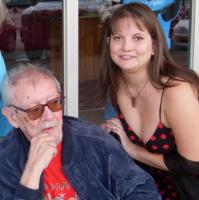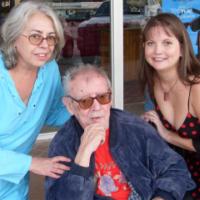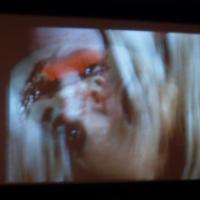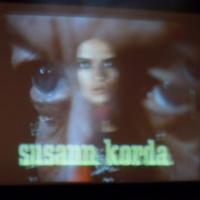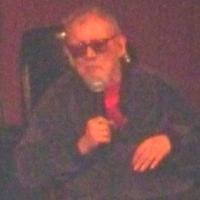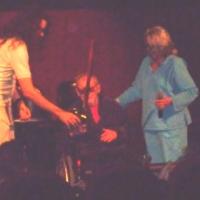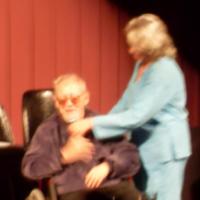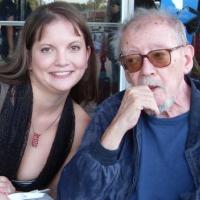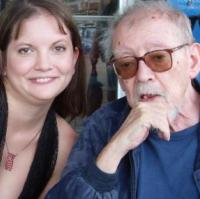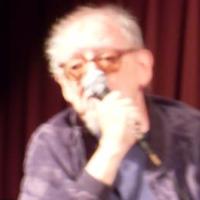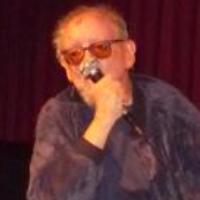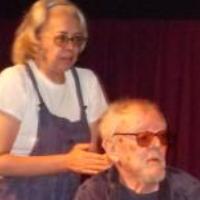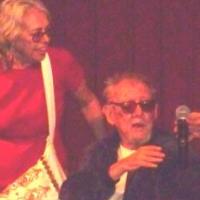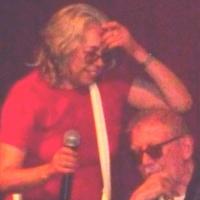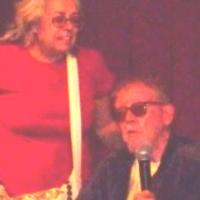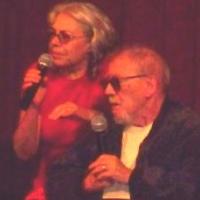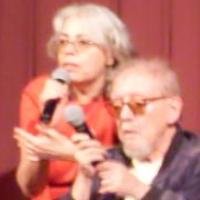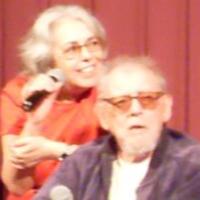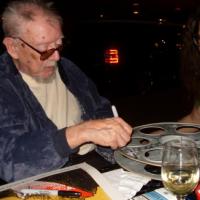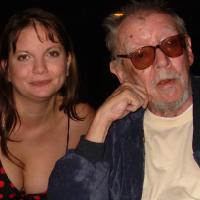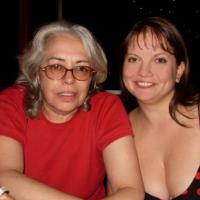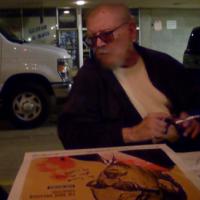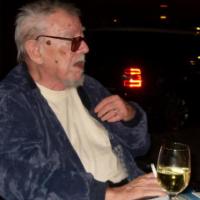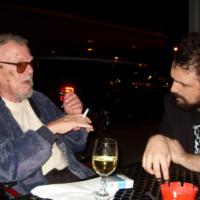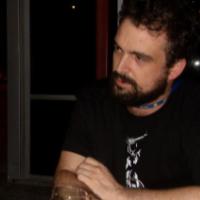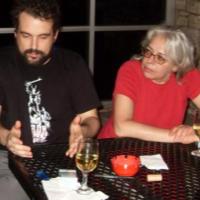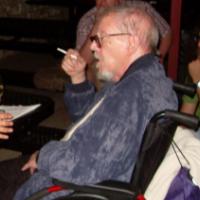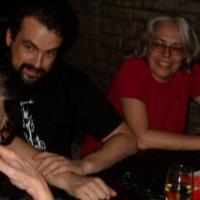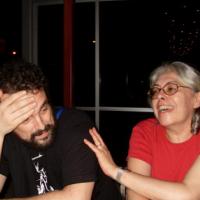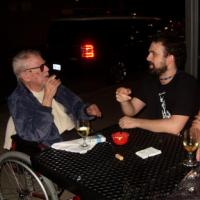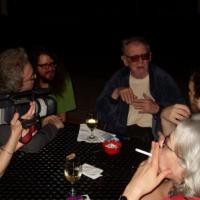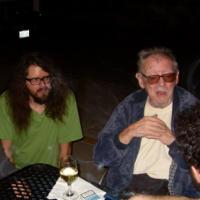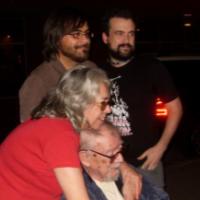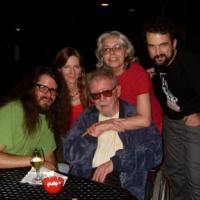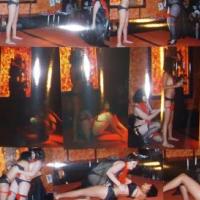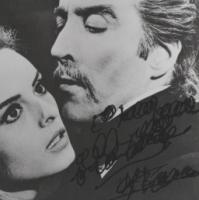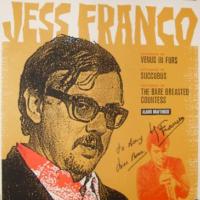 |
So here is my long-awaited, long-anticipated interview with Jess Franco about Soledad Miranda, preceded by an overall account of these once-in-a-lifetime experiences and meetings that happened the evenings of September 28, 29, and 30, 2009, in and around the Alamo Drafthouse Cinema in Austin, Texas. If you only want to read the interview, just scroll down. I had tried to get an interview years before, but that was long before I discovered all those Spanish magazines from Soledad's lifetime. At the time, all people really knew about her was her filmography and the most basic biographical details. However, as I've learned so much about Soledad as a person over the last few years with my research, my interview with Jess was able to be made up of precise questions, instead of just, "What was she like?" 2014 Update: I have digitized the audio and made a translation slideshow to go with it (most of the interview is in French). To listen to the interview and hear Jess in his own words, click here. For access to the Soledad magazine articles archive, which contains more than 230 articles about Soledad and her career and over 50 interviews with Soledad herself (all provided in Spanish and with English translation) and more, become a member of SoledadMiranda.com. Click here for more information.
I was looking at Robert Monell's Jess Franco blog a while back and read something that seemed too good to be true: Jess Franco would be attending the Fantastic Fest in Austin, Texas in the fall, where he would receive a Lifetime Achievement Award and they'd show several of his films. Jess Franco, the director whose films cemented Soledad Miranda's fame and who knew her better than any other director, the one who saw her the day before her car accident, the one whose producer was about to make her dreams come true. The one whose controversial films were banned in Spain for decades under Generalissimo Francisco Franco, but who recently received the Lifetime Achievement Goya Award, the highest honor in his country's film industry. See, I live in Texas, and attending this festival was feasible for me. I got in touch with a festival programmer and asked if they were showing any of Franco's movies with Soledad, but unfortunately they couldn't find good prints of any. Even so, the chance to meet Franco and even interview him about Soledad (not quite the holy grail, but something I've chased after for a long time), was quite exciting. I got my tickets to the screenings, prepared my interview questions, and headed to Austin.
I actually met Jess Franco briefly the evening before what would be the interview. And I hadn't planned on trying to meet him yet! But upon arrival at the theatre, I asked for my contact Lars Nilsen, who was handling the Franco programming at the festival. He was busy so his girlfriend Anne came up and said she could take me over to the Highball (the Alamo Drafthouse Cinema's neighboring bar/bowling alley/fest lounge) right then to meet Jess. I didn't expect that, but her helpfulness and friendliness proved to be indicative of what made Jess so enjoy this festival. (At the Q&A on the last night, he said this was the first festival he'd been to that he really enjoyed; he loves Austin because everyone is so open, friendly, warm, etc... Duh, it's Texas!) So we met outside the bar where Jess was holding "court", and I was sweaty and nervous, but I just dove in. I had already decided to address him in French (my second language), because I knew that he's better in French than in English, and I don't speak Spanish. I introduced myself, shook his hand, and he and Lina Romay (his muse, love, and companion for nearly 40 years) knew who I was and about the Soledad site. They seemed pleased to meet me. I arranged for an interview the next day (Lina helped take over that part of business). I gave Jess a copy of my questions (just in case I didn't get to interview him in person), the Soledad Sings! CD I had compiled (like everyone, he'd been surprised when I broke news of her pop records several years ago), my Vampyros Lesbos dance photos (a couple of years before, on Halloween, I had recreated the dance at a burlesque show, in hommage to Soledad), and a DVD of my most recent film (a short called The Perfect Partner, in case he was interested). I asked for a photo, and Lina stood aside, but I asked her to be in it too. It was funny because I asked the people standing nearby to take the picture, but I was still speaking French because I was nervous. But the photo request was understood anyway. I thanked Lina for her patience in the matter of the Soledad interview (having told Jess how important it is to cinema research and Soledad's fans), but she said it was no problem. I had been told a few years before by someone who'd worked with Jess and Lina that he did not like talking about Soledad, and at conventions she didn't like it when people always asked about her. I found quite the opposite to be true, thankfully! The whole meeting was unreal, like an out of body experience (however I do remember it, so that's something).
Then on to watch the Venus in Furs screening, preceded by some Franco trailers. When the one for Vampyros Lesbos came on, and then again at Soledad's appearance, the audience cheered and applauded (me especially)! There were brief remarks beforehand. Lars mentioned how this was a dream for him to have Franco here, these films having made such an impression on him as well as on so many others. And that maybe some people just have a receptor in their brain for this type of film (as other people clearly don't get it and even hate it). Lars presented him with the first-ever Ain't It Cool News Lifetime Achievement Award (Franco's appearance was virtually funded by Harry Knowles personally from his own pocket). It was a big sword, and Lars said they probably wouldn't give an award every year. Lars said, "Good luck getting that on the plane!" Jess handled the sword delicately, saying Lina would have to keep it away from him because he does not like real blood, only cinema blood. The screenings were preceded by messages that if you talk or bother your neighbors, after a warning, you will get thrown out by a manager, and yeah texting counts as talking. Cool! The print was loaned by a guy from New Zealand, whose only request was for Franco to autograph the reel. The quality wasn't terrific, not as clean as a restored DVD, but they wanted to use real film for these screenings. The Q&A after the film was quite interesting, including how Chet Baker proposed the idea to Franco, himself being a jazz musician, about that feeling that when you play your solo, everyone you've ever known is all mixing together in your head, and it's like a dream, these memories all run together, and you're not aware of the real world during your solo. And that background made the film make more sense, and was quite well put. Oh and Jess said it did well because the producers decided for publicity reasons, after the shoot, to call it Venus in Furs; before that it was known as Black Angel. So they went back and shot those song scenes to go with the new title. Then they opened questions to the audience, and some guy asked about working with Orson Welles, and Jess talked about that quite a while. A comparison of Don Quixote and Sancho Panza to Orson and Jess was suggested by Lars, and received quite agreeably by the audience and Franco himself! (This and the other Q&As were filmed, and hopefully most will show up online. You can find them on Vimeo.) Upon leaving, I ran into David Gregory, whom I'd barely met earlier. His company, Severin Films, has put out several Franco titles on DVD. He's known Jess and Lina for a while and came from LA to be there with them. We discussed the interview, and he said oral was preferable to written, so we set it up for the next day. (Thank goodness I'd brought a tape recorder!) It still was barely sinking in that I'd met someone who knew Soledad. Perhaps my brain simply couldn't handle that and maintain composure at the moment. :-) I got emotional later telling my cousin about Soledad and how I had this mysterious yet compelling connection to her (which prompted her past-life theory that you'll read more about below).
So the next day, I practiced my questions, thought of a few last-minute new ones (like what actress should play her, what language did she film in?), and went over my introductory remarks about how and why I was so nervous and how special this meeting was to me. I showed up at the Highball early enough to have a margarita (I was soooo nervous and excited, I really needed to chill out!). Apparently Jess and Lina were looking forward to the interview; David told me Lina had asked earlier, "We're meeting Amy today for the interview, right?" Wow! Jess, Lina, and David arrived and I walked up gingerly to their table, asking when would be a good time for the interview, and Jess said why not now, of course? I began my practiced remarks, which worked out more or less as I had prepared them. Though I said them in French, here I will recreate them in English. "I apoligize, but I was very nervous last night. I wasn't that nervous when I met Anthony Hopkins or Christopher Walken or Natalie Portman, but with you, I am nervous." Jess, shocked, asked "WHY???" My response: "To meet someone who knew Soledad, it's a very big thing for me. So thank you, because without you I might never have known about her. I don't know why, maybe I'll never understand why, but she's fixed in the very bottom of my heart. I feel like I have a calling to make her more known and tell the world her story. She said several times in interviews of the period that her dream was to be known outside of Spain. It's very gratifying to know that she achieved her dream, although many years after her death." Thankfully, Jess understood my (seemingly inexplicable) attraction to Soledad, as she was indeed a compelling mystery.
Well, as soon I rolled tape, Jess wanted a cigarette, and Lina had to tell him "Aquí no puedes fumar". So we went outside on the sidewalk. He was in his wheelchair and when we started, he asked if I wanted to sit. But I was on a mission to get the interview and there was no chair outside, so I politely declined. Lina stood listening a few feet away, there to help Jess remember titles or clarify my questions as needed, light his cigarettes, etc. People were milling around and looking at Jess. Most probably didn't know who he was. I was told later that, surprisingly, Jess and Lina were not getting a lot of attention at the festival. Perhaps that's why they took to me (and wearing a low-cut dress, I had thought, would improve my chances of getting an interview!). So the interview happened, morphing freely between French and English (and Spanish, when Lina was involved), and thankfully I got it all on tape. (It would take many later listens, even so, to decipher all that he said, and some was impossible to get.) After the interview ended, Jess said something like this: "She was funny, not beautiful or clever, but everyone loved her." Excuse me, NOT BEAUTIFUL?? Jess affirmed his opinion: "She was not beautiful. I saw her through my lens many times and she was not beautiful. But she had a mystery." (Mr. Franco, I and Soledad's multitide of fans respectfully disagree with that assessment! But then again, at one time Jess had no idea that Soledad had been a pop singer, and he now was expressing surprise that she'd been a dancer [he did not know about her debut film La bella Mimí, in which she was the lead dancer], or even that she'd done a film with Ingrid Pitt, so perhaps his responses should be taken with a grain of salt, as they say.)
And then we went back inside the bar. I had to go back to their table anyway because my (second) margarita was still there. I said I'd leave them be, but actually David, Lina, and Jess insisted that I stay. I asked Jess to autograph a photo of Soledad and Christopher Lee from Count Dracula. Poor Jess, he made loopy loops on the photo and I could make out his signature, but I have no idea what all he wrote above it. (I'm sure it was something lovely about keeping Soledad's memory alive. At least, I could hope!) At this point, some festival VIPs/guests joined the table. We were sitting around and talking with Jess and Lina. Some people milled around and took photos of Jess, but nobody approached him. Perhaps they thought not to intrude on his conversation. At one point I asked him about Christopher Lee, what does he think of all his success working in Star Wars and Lord of the Rings and with Tim Burton? Jess thinks Chris is a great actor, and is very pleased about his success. (Even though Chris never had great things to say of Jess, having been "duped" into an erotic film!) I was saying how it blew my mind that this guy held a lightsaber, and he bit Soledad Miranda (on film, of course!). I asked Jess if he'd had a chance to see my burlesque photos, and yes, he had, he loved them; I explained how it was such an honor for me to perform this as an hommage to Soledad, but that due to the nature of burlesque it was not completely authentic, what with the pasties. Jess thought the pasties were a terrible abomination. Of course! So then I brought up how my relative (a therapist who also does past-life regressions) was convinced that I must have known Soledad in a past life, perhaps as a sister; that any time you have such a connection to someone dead, and you don't have any apparent reason for this connection, it is a past life thing. So I was talking about this past-life theory (with the disclaimer, probably heard only by David, that I didn't really believe it, but that it was interesting), and Jess called me crazy. "Thank you!" And oh boy, the other people there thought that was great, as did I! What a compliment to be called crazy by Jess Franco! And that second margarita was making me feel pretty good too. I asked Lina if Jess would like to see the film Soledad did with Ingrid Pitt, and she said yes, so she wrote down their address for me. I wanted to pass her some questions about what she thinks of Soledad (and that she could say it was none of my business...), but, perhaps thankfully, it was time to go over to the Succubus screening, so the questions I'd just written went in my Tokidoki purse.
The print of Succubus was loaned by Quentin Tarantino. Jess prefers to call it Necronomicon. Again the print wasn't spectacular, but according to Lars is probably the finest out there. I knew this time that Jess and Lina sat in the front part of the auditorium, so I sat there too. Another Q&A afterwards, this time some discussion about how well the film did in Berlin, how it was the right film at the right time, how Fritz Lang approached him with his card and wanted to meet up later but Jess was very busy and did not realize until too late that it was FRITZ LANG who had wanted to see him, and then Lang had already left or something. Oh, Jess was kicking himself! I had been making some new friends that day. I was quite pleasantly surprised that several of these film people and others I met at the festvial knew my Soledad site, thought it was great; some even knew who I was. I had colleagues! It felt very rewarding. These guys by now had persuaded me to stay one more day for the final screening: The Bare-Breasted Countess, known to many as Female Vampire. So I changed my plans and arranged to stay another night (thank you, unemployment).
The next evening, I showed up early at the Highball, but Jess and Lina did not appear this time. Then was the screening of The Bare-Breasted Countess, which, with its title shortened, showed up on the ticket printout as The Bare-Breasted and on the marquee above the auditorium as The Bare-Breast! It was supposed to be a print from Image, but that didn't come through, so they sent the digibeta master instead. Jess and Lina had been going into the theatre, having opening remarks, staying for a few minutes, then leaving and not returning until the end of the film for the Q&A sessions. (They both dislike watching their films because they say they always second-guess their choices and such.) Near the end of the film, Lars asked me to go outside and get Jess and Lina. I did, and they came in, but the film actually had a few more minutes to go (it was the scene where Lina was in the bloody bathtub and Jess was looking on). I realized how special this moment was, that they were both there seeing it on the big screen, together, as this film was a love letter from Jess to Lina. I was glad to see that Lina kept standing there by Jess the several minutes until the end of the film. The Q&A after was very sweet; people wanted to thank Jess for this beautiful poem, this love letter to Lina. Lina said how she and Jess were trying hard not to fall in love while filming, but the island of Madeira is magical and dangerous; in other words, don't go there unless you are prepared to fall in love! Though they kept their passionate feelings under control until after the film was finished, Lina said she was making love to Jess through the camera in all her scenes. She also made a Polanski joke about their age difference. Well, now Jess and Lina have been together almost 40 years. However they only got married a year ago! The Q&A was so memorable, so special, and they were so nice and affectionate and so still in love. It was really touching to see that.
Then we hung around outside the theatre at a picnic bench talking with Jess and Lina, while they posed for photos, gave autographs, and had cigarettes and chardonnay. For quite some time Jess was speaking with the young Spanish director Nacho Vigalondo, whom I'm told is rather important (Oscar- and Goya-nominated and his film Timecrimes won at the Fest last year or something). Nacho remarked that it really meant something to him that he preferred to sit out talking to Franco rather than see the sneak preview of James Cameron's Avatar that he had so anticipated but was happening at the same time. I felt lots more relaxed, now my interview was done, so I could enjoy myself. I am so glad I stayed for a third evening. The first evening I met Franco, I was on another planet; the second time (the interview), I was incredibly nervous; but now, on the third evening, I already had what I'd come here for, so I could finally just enjoy Franco's presence without being nervous. I got his and Lina's autographs on the screenprint made especially for the festival (thank you Scooter for that gift!) and took lots of pictures. Well, eventually Jess and Lina called it a night. After they left we crazy fans finished off our surreal Jess-Lina evening by taking turns swigging down the last of their chardonnay from their glasses. Nacho in particular, he took Jess's glass and put his mouth around the whole edge, saying he drank from the same glass as Jess Franco! Well, we each had our souvenirs: their left-behind napkins; the now-empty chardonnay bottle and its cork; Jess's emptied cigarette pack, which I stuffed with his butts from the ashtray. (That may sound crazy, but give me a break... those lips touched Soledad's! On film, that is, not in real life. Jess always said that he was like an uncle to Soledad, which I firmly believe.) It was a delightfully unique communal experience to end such a fantastic few days. I will never forget this amazing trip.
NOW, THE ACTUAL INTERVIEW! (For these purposes, it is slightly edited and all put in English, whereas much of the conversation had been in French and even some in Spanish. If you're puzzled about any of my questions, go back and read her bio on this site!)
JF: You prefer to sit?
The next evening, while chatting with Lina Romay, I got her to clarify some general questions about Spanish language and culture that had stumped me.
AB: Lina, I have some questions for you about Spain...
A NOTE ABOUT THE PUSHKIN FILM: Upon researching "Dunia, la novia eterna", it seems that was the Spanish title of a 1940 film made by the German director Gustav Ucicky: Der Postmeister (aka The Stationmaster). According to IMDB that film was based on a short story by Alexander Pushkin ("Stanzionny smotritel" from the 1831 prose collection Povesti pokoynogo Ivana Petrovicha Belkina). IMDB does list a character in the film by the name of Dunja.
A NOTE ON THE SHORT STORY: "The Stationmaster" is perhaps the finest short story by the "father of Russian literature," Alexander Pushkin. One of the Tales of the Late Ivan Petrovich Belkin, the story chronicles the tragic story of a humble stationmaster and his beautiful runaway daughter. "The Stationmaster" is considered influential for its concise, plain style, a hallmark of Pushkin's writing. The story addresses themes such as familial vs. romantic love, moral corruption, the conflict between social classes, and the ambiguity of human existence. [For a full description of the story and a plot summary, go here. To read the entire story, go here.]
A NOTE ON THE CHARACTER OF DUNIA: Dunia is the stationmaster's daughter. The narrator is struck by her youthful beauty the first time he meets her. When he requests a kiss, she consents. She keeps her father's house in order, performing all the domestic duties earlier taken care of by her late mother. She is so lovely that ladies would give her presents and gentlemen would seek excuses to linger about the station to gaze at her. But she breaks her father's heart by running off to St. Petersburg with the wealthy young Captain Minskii.
Now, the role sounds like something Soledad would be good for, but really, Franco doing a Pushkin film? It's hard to imagine! Yes, he did some period pieces that were quite good, but they all had heavy exploitation elements. I asked Tim Lucas, a Franco expert, his opinion on the matter. "It's possible. Franco had been adapting works of other historical writers --- de Sade, Stoker, etc. I've never heard him mention this in interviews before, but he's not prone to invent things like that. Also, it was Brauner's idea, apparently, which means that, had Soledad lived, it would have been a Franco/Miranda package deal, and Jess would have moved up to making a higher class picture for Brauner. So when she died, he lost more than a star and a friend; his career took a serious shock as well."
|
© Amy Brown |








